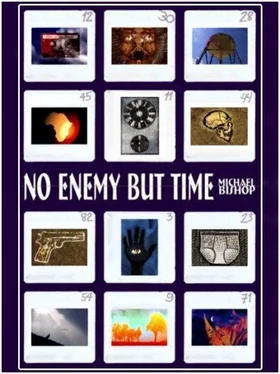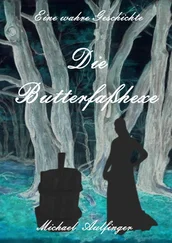“Where are we?” Anna called.
Pete kicked open his door, leaned out, and flicked on the spotlight he had installed that afternoon. Its beam swept the top of the opposite ridge and immediately struck fire from a pair of distant eyes. They shone like amber match heads there. The animal to which the eyes belonged stood unmoving, transfixed, in the trembling circle of the beam. An adolescent buck, by the look of the knobby points on its head. It was so still, so statuesque, that John-John tried to believe that a taxidermist had already mounted the creature.
Aloud he said, “I hope it isn’t real.”
“Of course it’s real,” Hugo responded, sotto voce . “What do you think, maybe it’s a piece of cardboard?”
Pete took his rifle from the cab of the truck, drew it out of its zippered scabbard, and sighted over the top of the half-open door. The deer gave a high, off-balance bound that carried it out of sight beyond the ridge top, whereupon the report of Pete’s rifle—so sudden it made Anna and John-John jump—echoed across the prairie like a thunderclap. John-John cried out, but Hugo reached over the truck’s sideboard and held his hand over the boy’s mouth until the night was quiet again.
“You missed him,” he told Pete.
“‘Fraid not. He was dead when he jumped. Let’s go see.”
Doors slammed shut, and the truck bumped through a narrow draw and labored to the top of the ridge from which the deer had leapt. Pete cautioned the Monegals against stepping on loose stones, cactus clumps, and live rattlesnakes, then led them down the far side of the ridge with his flashlight. John-John, hoping that Pete had missed and his deer had gone pogo-sticking into the open wilderness, struggled along behind the men. Twenty or thirty yards down the slope Pete directed the flashlight beam under the dry skirt of a piñon tree and got back the glitter of a glassy eye. Anna turned aside, but John-John stared at the shadowy carcass in disbelief.
“I’m gonna gut this little Billy Buck,” Pete informed Hugo. “You can cut off the legs and head. There’s a bone saw in the truck, under the seat. We need to finish up and skeedaddle before anyone spots us.”
Heedless of cacti, stones, and rattlesnakes, John-John bolted back up the ridge. Wind scoured his mouth and eye sockets. He hurled himself headlong over the rear tire well of the pickup and crawled to the quilt crumpled on the floor near the cab. He cocooned himself in this, curled up like a shrimp, and began to cry.
Anna reached him a minute or two later, coaxed him upright, and held him against her as the men went about the business of preparing the deer’s body for the trip home. The door to the truck’s cab opened once or twice during this work, but John-John paid no attention to what was going on. When Hugo and Pete emerged from the darkness for good, they were swinging the gutted, dismembered carcass between them like a bloody hammock. They laid it out in the rear of the truck on a painter’s drop cloth, then covered it with another piece of stiff canvas that Pete conscientiously lashed down with ropes.
By John-John’s imperfect reckoning, the trip back to Cheyenne took twice as long as the trip out. He and Anna had a grisly fellow passenger in the loadbed, and this passenger reminded him of the otherworldly carnage of his dreams. For the first time in his life, thanks to Hugo and Pete, he understood a few of the implications of that carnage. The implications frightened him.
Among the Minids
Exhaustedand shaken, I returned to New Helensburgh with the habilines. The trip back included a detour through the acacia grove where I had made my headquarters. Here I picked up much of the gear—rope, jacket, shaving bag, and so on—that I had not carried to Lake Kiboko with me. (Malcolm and Roosevelt were toting the uneaten portions of my kill.) I had explained the need for this side trip by improvising finger lingo, snatches of pidgin Phrygian (an ignorant king having once decided that Phrygian was the oldest human language), and a range of facial tics and tremors that would have done Mary Pickford proud. These ploys, in combination, had persuaded the Minids to follow me to the place where I had stowed my gear, for, to communicate with one another, they were themselves dependent on hand signals, vocalizations, and a subtle repertoire of eye movements. While gathering my belongings together I was especially conscious of how much information they appeared to be able to transmit through glances, blinks, and brow furrowings. They could “whisper behind my back” without having to face away from me.
Once in New Helensburgh itself, a wide ledge on a hillside overlooking the steppe, I had to contend with the curiosity of the children and the mistrustfulness of their mothers. The male habilines had ceased to regard me as a threat, but the women did not want me touching their offspring, bribing them with sugar cubes, entertaining them with the narrow beam of my penlight. That the children—especially Malcolm and Miss Jane’s little imp, the Gipper— enjoyed being terrified by this strange instrument, and came back again and again to have their minds teased and their pupils shrunken, did not soften this maternal hostility.
I was not allowed to enter any of the four clumsy huts on the ledge, or to partake of the women’s food stores, or to wander too near when Odetta took her toddler Pebbles up to the hilltop for walking lessons, which always occurred under the vigilant gaze of Fred, Roosevelt, or Malcolm.
In short, I was a second-class citizen. My sophisticated wardrobe aside, I was the Minids’ resident nigger, only begrudgingly better than a baboon or an australopithecine. The role was not altogether unfamiliar.
My survival kit contained a six-foot tube tent and a windscreen. I pitched the tent and erected the windscreen about thirty feet from the citadel’s main thoroughfare. A dwelling of bright yellow plastic, the tent invited—yea, demanded—the curiosity and admiration of the Minid children, who liked to play inside it whenever I left it untended even for the duration of a whiz in the weeds. On my third day as a semihonorary habiline, in fact, I returned from emptying my bladder to find Jocelyn, Groucho, and Zippy entangled in twenty feet of fishing line. My Bible-cum-field guide, meanwhile, lay three quarters of the way down the slope, its pages riffling in the breeze like the wings of lazily mating moths. I had to cut the young Minids free with my pocketknife, thus ruining the fishing line, while Groucho kept baring his teeth and screeching. After releasing the children I looked outside my tube tent to find it surrounded by fretful Minid hunters as well as their wives. Thereafter, despite the inconvenience, I rolled up the tube tent every morning and redeployed it in the evenings when I was ready for bed. My knapsack became a permanent daytime fixture between my shoulder blades because I did not dare leave it anywhere else. Quasimodo Kampa.
If I fit into the Minid band at all, it was because of Helen. She took a special interest in me, I think, because I simultaneously mirrored and magnified her own predicament vis-à-vis her conspecifics.
Granted, she had once joined the hunters in attacking me, but her participation had probably resulted not so much from a fear or a mistrust of me as from her own innate allegiance to her people—even if her lot among them was decidedly peculiar. I had ceased to be a complete outsider to the habilines because their own outsider-in-residence had chosen to acknowledge my existence. We were two of a kind, Helen and I. Our similarities transcended even the gross and arbitrary dictates of taxonomy.
Helen’s status among the Minids derived from two unusual conditions. The first was her size, which made her either equal or superior to her male counterparts in speed and strength. She could outrun even Alfie, and although he might have been able to overpower her physically—a dubious speculation at best—he tended to avoid situations pitting him head to head against Helen or any other habiline. He ruled by force of personality, the hint of intimidation. If Helen submitted unquestioningly to his preeminence, she may have done so because her speed and strength did not yet give her a psychological antidote to the social dictates of gender. A big, strong, swift-footed, and cunning female was still a female.
Читать дальше



![Ally Carter - [Gallagher Girls 01] I'd Tell You I Love You But Then I'd Have to Kill You](/books/262179/ally-carter-gallagher-girls-01-i-d-tell-you-i-lo-thumb.webp)








